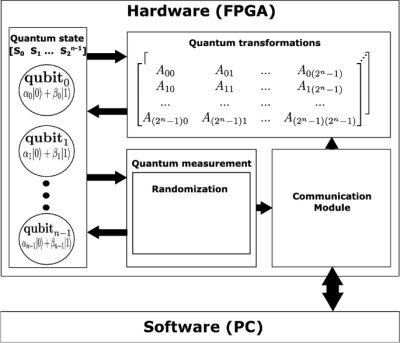When Iran recently announced a quantum processing algorithm (Google translation) that would help its military to detect water surface disturbances, the instant response from Western media was one of ridicule, based on the displayed hardware. The hardware in question was the Digilent ZedBoard Zynq-7000 hybrid SoC/FPGA development board, which can be yours for less than $600.
Seems absurd, and the claim about any realistic military use absolutely is. But buried deep, deep down, there may be a tiny kernel of truth: because quantum computers are inherently parallel, FPGAs can make a good fit for small-scale quantum simulations.
Does this mean that the Iranian Navy would be better off simulating quantum circuits on an FPGA board than on a GPU or even a used laptop? Probably not. Will this hardware serve the proposed military application in the forseeable future? Absolutely not! Was this a misleading and ridiculous photo op? Yup. 100%.
But is emulating qubits in FPGA fabric a real thing? Turns out it is! Let’s have a look.

Because classical computers are rather slow at running quantum computing algorithms, an FPGA could have a chance at improving performance for this task, as demonstrated in a 2004 paper by A. U. Khalid et al. (also here as a PDF in the masters-thesis version) as well as in An FPGA-based real quantum computer emulator by Jakub Pilch et al.
In the latter paper, which includes a great overview of the state of the art, Pilch and colleagues summarize this as shifting the processing from time to space — from using slow sequential CPU processing to hardware complexity, using the FPGA’s configurable fabric and inherent parallelism.
What’s the cost? FPGAs have a limited number of cells, and the time-space tradeoff that Pilch et al are making limit them to two qubits. That’s four states. You have more fingers on one hand. By filling up the entire FPGA, they are essentially able to implement a two-bit quantum XOR. So much for real-world military applications.
The less parallel approach taken by Khalid et al allows for nine simulated qubits on the same FPGA, but is dramatically slower and not much more practical. Both papers suggest that the tradeoff between speed and FPGA fabric space looks exponential, so any FPGA simulation will necessarily be very small or very slow, chose one. Indeed, for practical simulations, Google recommends renting a bunch of GPUs instead.
The whole promise of a real quantum computer is that it allows for parallelism and speed, and that’s of course where all classical simulations come up short. And this is why we’re calling BS on the Iranian claims. But we were excited to learn about FPGA-based qubit simulation along the way, and any simulation is great for learning. If you’re interested and you don’t have an FPGA board, you can do it all from the comfort of your web browser, or heck, even an Arduino if you need a prop for the photo op.
Thanks to [Andrew Wilson] for the tip and citations.
















I wonder if this technology will be integrated onto their Qaher 313 stealth fighter platform.
Yes, they are just waiting for the delivery of some halal arduino clones from AlisExpress.
XD
Hey, probably they have stolen the idea from Vitalik Buterin:
https://davidgerard.co.uk/blockchain/buterins-quantum-quest/
It seems dubious, but I do suspect confirmation bias at play.
It seems ludicrous to think that any nation would show the secret hardware associated with a break through technology!
If it weren’t for that the fact that it’s Iran making the claim I’m sure people would easily come up with the most likely explanation.
The Digilent board is the non-classified component in the system. The role it plays? Probably fabric logic between some experimental system and traditional military hardware.
Iran probably doesn’t have some quantum tech we’d be excited by, but we could not determine that based on a press release. Infact it’s likely we wouldn’t know for quite some time if they did or didn’t.
Not to mention the “real” quantum computers are kind of sketchy/might just be a gimmick too
Yeah, although not just confirmation bias, but also manipulation by the media (1984 style). Note when Iran started manufacturing it’s own submarine news headlines read “Iran’s homemade submarine” since “homemade” has far less credibility than “domestically produced” (which would be the headline for an ally nation doing the same).
Also, I think there is a mistake in the article, the “ridicule” link seems to point to the original article about Iran’s claims. Probably this point to:
https://www.iranintl.com/en/202306086480
or
https://hackaday.com/2023/06/15/irans-quantum-computing-on-fpga-claim-its-kinda-a-thing/
(The only articles I found with “ridicul*” in the title.)
Although the real news probably isn’t so much Iran’s quantum computing hardware, but the approach of analyzing water surface disturbances to estimate positions of submarines.
The problem is that Iran has time and time again said they have fabulous thing X, only for it to be proven otherwise.
These sorts of announcements aren’t to impress the world – they are trying to impress their own people.
We’re nearly at the end of 2024, how much of your ideas about Iran has changed so far? Perhaps after operation True Promise 3, you’ll be making fun of all the US and Zion claims! As for Iran’s mastery of quantum physics you’ll be hearing more of it!
LoL
What pride can make you believe…
https://en.wikipedia.org/wiki/Huemul_Project
could be total BS all the way down but i assume a stuffed shirt saw a paper about “AI” or something else neato and vaguely real, and condensed it into a list of technobabble that got re-condensed into the wrong word “quantum”
Im not saying that Quantum Computation is bullshit in it’s entireity… buuuut i’m not seeing any western companies developing any kind of meaningful prototypes that are in any way useful, Error Correction is the stumbling block that compounds with scale long before any kind of useful operation can be made IMO. I hope im wrong and even with confirmation bias its hard to find others who agree with me.
But it’s easy to laugh at Iran blowing smoke up our asses with fake quantum computer breakthroughs, but every western tech monolith has been promising progress and breakthroughs in a few years for well over a decade now. and i struggle to get anyone to explain to me what ‘hello world’, blinking led of a quantum computer looks like let alone see it running.
Interesting. They are making great progress in drones, having brought down a US drone several years back. This could be another advance.
Before WW2, US considered Japanese aviation to be backward. Then they met Mitsubishi Zero.
Humility is not really a strength of US to say the least, nor is its general level of education compared to many countries. How much % of all scientists working in US were born US nationals ?
“its general level of education compared to many countries. ”
Many (read the (R’s) ) …. have been destroying the US education system for
50+ years. It’s much easier to control stupid people. :(
Interesting and like hackaday for diving deeper into the claims. I personally wouldn’t doubt the Iranians, extremely smart bunch of people. Leaving the politics aside. Their engineers are second to none.
I haven’t verified it, but from memory, emulating quantum computers has been done for years. For example for research and algorithm development and testing.
It is important to note that the initial source of the information in question is “Iran International,” a media outlet known for its history of disseminating fabricated news through photo manipulation and editing. Iranians have demonstrated their proficiency in countering such misinformation by consistently exposing the falsehoods propagated by “Iran International.” Individuals with an academic background understand the remarkable capabilities possessed by Iranian scientists. Iran has successfully designed and developed their own advanced generations of nuclear centrifuges, ICBMs, and hypersonic missiles. They have also achieved the feat of capturing and enhancing US drones, subsequently engaging in mass production. Remarkably, Iran’s drone technology surpasses that of both China and Russia. Iran has made commendable strides in the fields of science and technology. As someone who has had the privilege of collaborating with Iranian scientists in Iran as well as those of Iranian descent in the Netherlands, I must emphasize that my confidence in the veracity of this news remains relatively low until I have personally witnessed a video substantiating the claims. It is crucial to acknowledge that Iran has achieved these remarkable advancements despite operating under the most stringent and illegitimate sanctions imposed by the United States. Therefore, it would be prudent not to rejoice prematurely over this dissemination of false information.